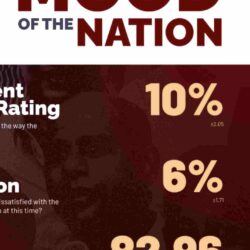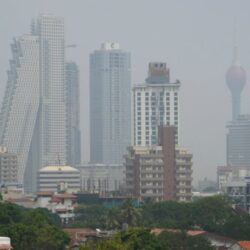Published on The Morning
The Cabinet last week approved a relief package worth Rs. 229 billion presented by the Minister of Finance. For Gayathri (35) (not her real name), it brought much joy going into the new year as she is struggling to feed her daughter after her husband was paralysed by an accident last year.
“Finally, the prices of the vegetables will go down now,” she said joyfully.
However, the truth behind the relief and tax cuts is far darker than Gayathri could understand, because her daily struggle is merely to survive with just two meals a day.
Through the new relief package, the Government proposed to provide an allowance of Rs. 5,000 to public servants, an additional Rs. 1,000 per Samurdhi recipient, Rs. 20,000 per acre for home gardening, a supplementary payment of Rs. 25 per kilogramme (kg) of paddy to the already guaranteed price of Rs. 50 per kg, etc.
Most importantly, the Ministry of Finance decided to cut taxes on essential food items and pharmaceutical products. Moreover, on the last day of 2021, the Finance Ministry announced a Rs. 30 reduction of the Special Commodity Levy on imported potatoes and red onion.
How will this relief package affect the economy?
No significant impact on domestic inflation
Australian National University Crawford School of Public Policy Arndt-Corden Department of Economics Professor of Economics Premachandra Athukorala said that the abolishment of only domestic taxes is unlikely to have a significant impact on domestic inflation.
“As far as I know, the domestic taxes on these goods account for a tiny share of government tax revenue. However, abolishing import duties together with dismantling direct import restrictions (quantitative import restrictions) would certainly help in taming inflation,” he said.
Colombo-based independent think tank Verité Research Research Director Deshal de Mel said that most of the pharmaceutical products are already tax-free, except for a few ayurvedic products that have import duties.
Moreover, he said that a lot of the taxes on essential food items are border taxes to protect domestic suppliers, therefore removing such taxes is not without costs and will not be a straightforward process.
The economist added that since pharmaceutical products are already largely tax-free, there is unlikely to be any impact on pharmaceutical prices. Essential food items, where taxes are easily removed, are also likely to not experience a material impact on prices.
Deepening economic crisis
Prof. Athukorala said that he does not think the Government will go for the option of removing import duties and abolishing direct import restrictions, given the deepening balance of payments crisis the country is facing.
Further, he pointed out that this relief package itself would certainly exacerbate the macroeconomic crisis, as the dwindling budget deficit would require printing money. This will lead to inflation which in turn leads to real exchange rate depreciation, thereby discouraging exports.
De Mel also pointed out that since this relief programme does not have parliamentary authorisation for expenditure, it is likely that the additional spending would require a fresh supplementary estimate.
He noted that this would go against the Finance Ministry’s commitment in the 2022 Budget to refrain from supplementary estimates in the future.
According to de Mel, who was an advisor to the Finance Ministry under late Finance Minister Mangala Samaraweera, the new spending measures would be adding to existing high levels of fiscal stimulus, alongside accommodative monetary policy, in what is already a high inflation environment.
“In the absence of new tax measures, a further increase in the budget deficit resulting from this additional spending can only be avoided by cutting expenditure elsewhere in the budget, particularly capital expenditure,” he said.
However, he stated that the Government has not identified expenditure reduction measures sufficient to net off the new spending measures.
Further, he said that it would have been prudent to address the root cause of the current escalation of prices in the market.
“Whilst global supply chain issues have resulted in price increases around the world, shortages and price escalation in Sri Lanka is compounded by the sharp decline in foreign currency reserves. The limited forex availability has led to delays in opening letters of credit (LCs) and shortages of key imported products in the market,” he said.
As of the end of November 2021, usable gross official reserves were $ 1.58 billion, of which convertible foreign currency reserves amounted to only $ 1 billion. Liabilities maturing in January and February alone amount to $ 1.8 billion. Liabilities maturing during the full year in 2022 amount to $ 6.9 billion, according to available data.
De Mel said that it is necessary to identify a solution to this mismatch between reserves and maturing liabilities, beyond short-term swaps which are not sufficient to address the problem at hand.
Open University of Sri Lanka Department of Social Studies Emeritus Professor of Economics Prof. Sirimevan Colombage said that the expenditure hikes and tax cuts presented by the relief package will further widen the budget deficit.
According to the Budget Speech 2022, the budget deficit for 2022 was estimated at Rs. 1,626 billion (8.8% of GDP), compared with Rs. 1,826 billion in 2021.
However, Prof. Colombage said that this is highly unrealistic as it was assumed that the revenue would go up by 46% in 2022. On the revenue side, all taxes and levies are to be removed for essential goods and drugs.
“Assuming a 10% increase in revenue, the budget deficit for 2022 would be around Rs. 2,200 billion (12% of GDP) as per my estimate, and with the new package, the budget deficit will go up by at least Rs. 200 billion this year to around Rs. 2,600 billion (15% of GDP according to my computations), instead of the estimated deficit of Rs. 1,600 billion,” he added
Prof. Colombage, who was a former Central Banker, said that the Government will have to raise further borrowings from the banking sector, particularly from the Central Bank of Sri Lanka (CBSL). For this purpose, the CBSL will have to purchase more Treasury bills which will lead to a rise in the monetary base and new currency issues (money printing).
He said that the demand-pull pressures arising from high money supply growth will accelerate the already high inflation.
“Year-on-Year (YoY) inflation is likely to reach over 25% in time to come. The relief package will further destabilise the economy due to the above reasons. The Government adopts pro-cyclical measures instead of counter-cyclical measures,” he said.
“What this means is that the Government should have cut down the budget deficit (counter-cyclical) instead of raising it (pro-cyclical),” he further added.
IMF sweetener?
Prof. Athukorala said that the Government has introduced these ‘sweeteners’ to set the stage for going before the International Monetary Fund (IMF). “I think entering into an IMF-supported stabilisation package is the only viable option available to the Government,” Athukorala added.
De Mel pointed out that what is required is for Sri Lanka to engage in negotiations with creditors to restructure its maturing liabilities, to free up reserves to pay for essential commodities and imported inputs for the economy to function.
The sustainable solution to this prevailing crisis is for the country to improve its credit ratings by at least three notches, regain access to global capital markets, and enable a build-up of foreign reserves to finance the needs of the economy through a normal flow of imports.
Prof. Colombage said that the relief package is exactly the opposite of the IMF-type macroeconomic stabilisation programme. The resulting macroeconomic instability will further worsen price stability, export competitiven
Last modified: October 16, 2023












